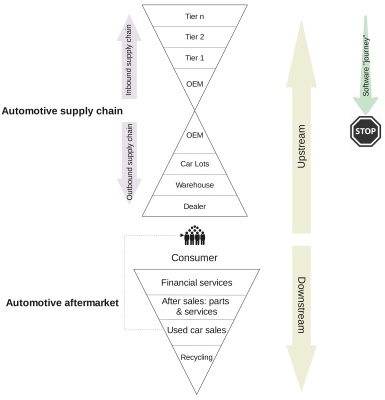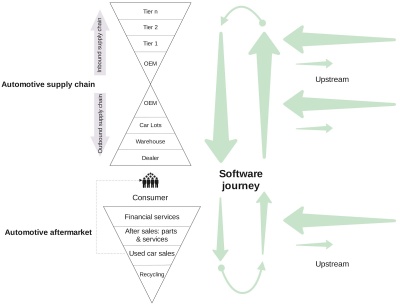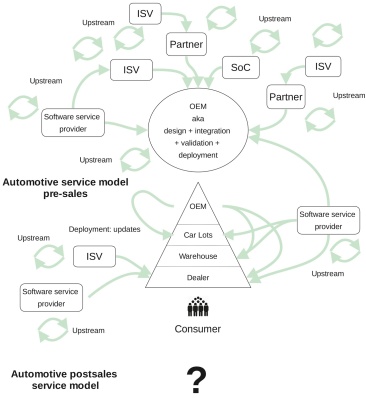Software in automotive yesterday
The automotive industry has treated software like any other component, as part of the traditional, well structured and highly controlled supply chain. Tier-1’s has been providing software to car auto-makers for some years now and both together have done what they have could to prevent consumers or downstream players in the supply chain from manipulating it, improving it, customising it nor from adapting it. It didn’t matter if the software was Open Source or not, they have treated it as if it was proprietary, promoting locked-in practices. Only very few stakeholders with the right kind of agreement could manipulate it in a very limited way. Consumers and third parties didn’t have a say.
For a software company, there has been no life outside the traditional supply chain of any auto-maker.
From all the reasons I’ve heard since I am involved in automotive, that justifies this situation, arguments related with security together with the safety critical nature of some systems shipped in a car are among the most popular ones.
But wait, once I buy a car, I can manipulate or even change the engine, the suspensions, the tiers, the brakes… but I can’t even dream about changing the software? Eveny if it is Open Source?
Software in automotive tomorrow
In my opinion the current way software is treated by automakers, the supply chain associated to them and the current business model around software in automotive will change dramatically. And the main reason will not be the license of the software used but the fact that the increasing amount and complexity of the software shipped with any car, together with the challenges that connectivity and privacy bring, will open up the door for new new players with new business models, Open Source business models. Those new factors will also provide current stakeholders in the supply chain the opportunity to increase their services around software. New players will challenge the current controlled and centralised environment.
I believe the software supply chain will expand beyond the purchase of the car, providing inputs at every level. Initially this will take place in a semi-controlled way, specialy by dealers, but later on software will become a major point at every stage, where there will be a wide offering of security and performance improvements, deployment of new functionality, maintenance services, customizations, integration with third party services, etc., to consumers directly by ISVs, enhancing the user experience adding more choice and adaptability to their particular use cases. The role software companies today play as providers will be substitued by a partnership relation.
In the same way that we all have a relative that “fix cars”, there are many developers out there that can put their hands on the provided software of their own vehicles. There are also many companies willing to do the same for their own fleet or somebody else’s one. A new car cost a hundred times more than a mobile and its life cycle is at least five times longer. I do not think the mobile industry will be the mirror for autmotive.
I believe that the picture will be closer to the current one in the enterprise industry, even if the journey to get there is diferent. Some automakers might remain as key stakeholders when talking about software, but not like today.
The consumers demand for more and better services and the portability needs across the different platforms and devices (cars) in order to make business with software at scale, will increase the pressure on OEMs and Tier-1s over hardware and software standarization. That pressure might become in some cases as strong as govements regulations, I think. It will be definetly stronger that in the mobile industry. I see this as a positive factor for consumers.
Experience shows that, if you intend to control a software ecosystem, you need to become upstream and create around your software a business model that serves as a service platform for third parties (ISVs). Maybe not even then you will be able to stay in control of what the customer is consuming. In other words, to be like Apple you need to control the hardware, develop at least the software platform and create a field for third parties to make money through “your platform”, which means at least controlling the distribution and updates.
I do not believe automakers will be able to achieve that same level of control being only a Open Source consumers in a connected world, by restricting access to your platform to anybody but those who are part of your supply chain. not even if they become Open Source contributors. And no, the Android model does not apply to a single hardware (car) vendor.
I am obviously no guru so take all this as nothing but a personal opinion from an Open Source geek. But if you think it is feasable for an automaker to achive similar levels of control with Open Source based platforms than Google or Apple has over their ecosystems in the mobile industry, I think you are at least as crazy as you claim I am.



Right here is the right web site for anyone who hopes to find out about this topic.
You understand so much its almost tough to argue with you (not
that I actually would want to…HaHa). You definitely put a new spin on a subject that’s been written about for many years.
Great stuff, just excellent!
LikeLike